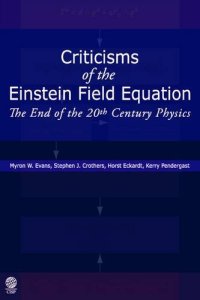In about 1915, Einstein and Hilbert independently inferred a field equation of general relativity based on the geometry then known to them. Almost since inception this equation was criticised by prominent physicists and mathematicians, notably Schroedinger (1918) and Cartan (early twenties). The latter clearly informed Einstein that the type of geometry that he used had a fundamental error in it, it omitted consideration of a quantity known as spacetime torsion and used the wrong symmetry for the geometrical connection. These criticisms were brushed aside when Eddington claimed to have verified a prediction of the theory, the angle of deflection of light grazing the sun was twice the Newtonian value. It is well known by now that this claim by Eddington was subjective, the usual mistake was made of choosing data to fit a theory. It finally became clear that the field equation is hopelessly incorrect when the velocity curves of spiral galaxies were discovered in the late fifties. About that time a new generation of mathematicians and theoretical physicists began to elevate the Einstein field equation into the realms of pure mythology, it was claimed to have produced "big bang" (a derisory term coined by Sir Fred Hoyle). It is now known experimentally that this claim is again hopelessly wrong. So there is a domino effect going on, all that is known about the universe is totally wrong as one BBC programme put it recently. The reason for this is the use of the wrong type of geometry by Einstein, right at the beginning of the subject.
In 2003 one of the four authors of this book began to construct a unified field theory of general relativity called "Einstein Cartan Evans" or ECE theory. This time, the geometry was correct, and physics was based on torsion. The ECE theory has developed into about 168 source papers to date and several books and articles by ECE scholars. It has made a phenomenal worldwide impact, indicating a great dissatisfaction with the obsolete physics. This book is the first to collect the severe criticisms of Einstein that are now commonplace. Not only have cosmologists adhered to an incorrect geometry, like glue stuck to marble, but they have also compounded this error by using incorrect methods of solution of an incorrect equation. The result is, unsurprisingly, totally wrong. One of the four authors of this book is the most severe and tenacious critic of these methods, Stephen Crothers, whose careful scholarship has unearthed some amazing mistakes repeated in perpetuity. The first chapter is an introduction by Myron Evans, and in the second chapter he summarizes the development of ECE theory. The third chapter is by Stephen Crothers, and summarizes his numerous criticisms of the incorrect methods of Einsteinian cosmology, criticisms made with characteristic intellectual honesty for more than a decade.The fourth chapter is by Horst Eckardt, who makes use of computer algebra and the Evans Identity of geometry to show that all the metrics that are solutions of the Einstein field equation are incorrect due to neglect of torsion. The computer algebra ensures correctness and is the only way to deal with the often bizarre complexity of the meaningless and obsolete physics that grew like detritus around the Einstein field equation. The fifth chapter is by one of the leading astronomers in Britain, Kerry Pendergast, who gives a readable account of the new post Einsteinian astronomy, how ECE theory should be used in astronomy and how to come to grips with Hawking's sudden abandonment of his big bang theory in 2005.
Download the book Criticisms of the Einstein Field Equation: The End of the 20th Century Physics for free or read online
